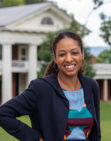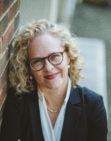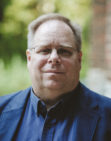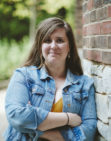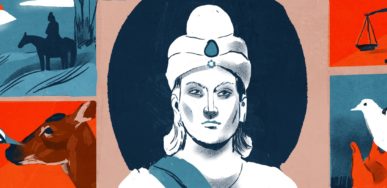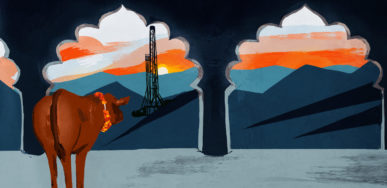[00:00:02] Martien Halvorson-Taylor I'm Martien Halvorson-Taylor.
[00:00:04] Kurtis Schaeffer And I'm Kurtis Schaeffer. We're both professors of Religious Studies here at the University of Virginia.
[00:00:10] Martien Halvorson-Taylor And this is Sacred and Profane.
[00:00:19] Martien Halvorson-Taylor With the help of faculty and students here at UVA, we explore stories of religion in daily life. We're interested not just in what and why people believe, but how they believe.
[00:00:32] Kurtis Schaeffer Yeah, that is to say we're interested in how religious belief and practice affects how people see their place in society. How it shapes our identity and sense of self, and the actions we take because of our beliefs.
[00:00:43] Martien Halvorson-Taylor This year marks the 25th anniversary of the genocide in Rwanda, when roughly one million people were killed over 100 days. It was the culmination of years of growing violence against the Tutsi minority. It’s an era that’s still not resolved. After the violence, the new government’s official stance was to promote unity and forgiveness. But Rwandans continue to debate how to remember the genocide, and to ask if it’s even possible to forgive. And our colleague Larycia Hawkins has come to us with a story about that very question
[00:01:36] Larycia Hawkins For me this story started in 2014 when I was visiting a student of mine in Rwanda. She was working with an organization that was trying to help both victims and perpetrators in the aftermath of the genocide.
[00:01:52] Christophe Mbonyingabo People don’t believe truly that such power of forgiveness can happen
[00:01:55] Larycia Hawkins This is my friend Christophe.
[00:02:00] Christophe Mbonyingabo I am Christophe Mbonyingabo. I'm from Rwanda, and I'm the director of CARSA.
[00:02:03] Larycia Hawkins CARSA stands for Christian Action for Reconciliation and Social Assistance. I got to know Christophe during my trip in 2014. By the way, I should mention here that I eventually joined CARSA's board. He's been working on these big questions you raise, Martien, how to remember and how to reconcile, for over 20 years now.
[00:02:23] Christophe Mbonyingabo Can someone forgive someone who murdered their entire family members and all that - truly, can they live again together? Those are the kind of questions and the doubt that people bring in. And I understand. Because from the human perspective, it seems to be impossible
[00:02:45] Larycia Hawkins Christophe says the closeness of perpetrators and victims can be hard for outsiders to grasp. Rwanda, then and now, is a small country. People know their neighbors well. These were not anonymous killings.
[00:02:57] Christophe Mbonyingabo The genocide was committed by the neighbors. It was a genocide of proximity. It was genocide where people had to kill their friends. People with whom they grew up, people they knew well.
[00:03:15] Larycia Hawkins He says that the other thing that's hard for people to understand is what led to the genocide in the first place - the divide between Hutu and Tutsi. It's very real in that people believed in it enough to kill. But it was a division that was encouraged and reinforced by colonial powers in the 20th century.
[00:03:30] Christophe Mbonyingabo Those names existed, but there were more, more social classes-based, not ethnic groups. So whoever had 10 cows and above was called as Tutsi, and whoever had less than 10 cows or nothing was called as Hutu.
[00:03:45] Larycia Hawkins In other words, people could become Hutu or Tutsi as they went through life. It wasn't an ethnicity, and there wasn't a Hutu or Tutsi part of the country. Most villages and neighborhoods were a mixture of both. But when the Belgian colonial government began issuing I.D. cards, suddenly these labels became a fixed identity.
[00:04:10] Christophe Mbonyingabo And so, when the colonial came in, especially the Belgians in 1916, they wanted to use their policy which was... divide for rule.
[00:04:36] Larycia Hawkins After the genocide, Rwanda's new government had to make a choice. Should the country even continue to exist as one? The divide between the Hutu majority who had carried out the genocide and the Tutsi who had largely been the victims was very real. There were hundreds of thousands of perpetrators and survivors scattered all across the country. It seemed an impossible task to ask them to live together again.
[00:05:03] Christophe Mbonyingabo That's where actually some of the advice, the advices the Government was receiving.
[00:05:10] Larycia Hawkins Right, from some international community.
[00:05:12] Christophe Mbonyingabo Yeah, you know. It's impossible, these people cannot live again together. You need to separate the country, and divide the country into one half with the Tutsi and the other half the Hutu. All that. So that was one of the choices.
[00:05:27] Kurtis Schaeffer Well, Rwanda still is one country today. So what choice did the government make?
[00:05:32] Larycia Hawkins Well it's complicated, but the short version is to stay together as one country, to find the perpetrators, and take them to court and hold them accountable. But that presented its own problems.
[00:5:45] Christophe Mbonyingabo It was a difficult choice to make. One side was, are we going to keep all these people in prison forever? How are we going to judge a hundred thousand people, you know, if we just go through the normal justice system? How long will this take? The costs, the burden, and the work, for the country. It was difficult, until the government decided to use a very traditional way, which is coming from our, you know, culture, which is called a Gacaca court.
[00:06:18] Larycia Hawkins The Gacaca courts weren't perfect. There are allegations of corruption and false charges from both survivors and perpetrators. But they allowed survivors to speak out, and sent over a hundred thousand perpetrators to prison. And because the courts were convened across Rwanda with local community leaders giving judgment instead of criminal court judges, justice happened quickly. The Gacaca courts also offered perpetrators a way back into society.
[00:06:49] Christophe Mbonyingabo People were encouraged from the prisons to come forward, speak the truth, confess their crime, and with their sentences being reduced.
[00:06:58] Larycia Hawkins If they confessed their crimes, they would be allowed to return home.
[00:07:02] Christophe Mbonyingabo I cannot say it's everything, it's 100 perfect. But I think it helped, really. And that's showed the will, the political will of building reconciliation after the genocide.
[00:07:15] Larycia Hawkins And all of this worked on a nationwide level. The country stayed together. People began to have faith in the new government. The economy improved. Daily life became routine for many. But Christophe says that while this kind of legal forgiveness was working on a national level, that wasn't true on a personal level for many Rwandans. When perpetrators got out of prison, they went back home. Survivors and perpetrators were once again living in the same towns and villages. They saw each other every day.
[00:07:57] Christophe Mbonyingabo There is another journey to make. With all the brokenness and the trauma and what people had gone through. There was a need, obviously, of helping people to recover not only socially, politically, economically, but also to recover psychologically.
[00:08:22] Larycia Hawkins Both sides were living in fear of each other. The survivors, of course, feared the perpetrators would return and kill again. And the perpetrators feared the survivors, too, and the revenge that they might take.
[00:08:34] Christophe Mbonyingabo You know, as human beings, when you've been harmed, when you've been abused, the first reaction is trying to find revenge. I kept thinking, like, for how long are we going to live under this situation? Asking difficult questions to myself, trying to find who is God, and why God allowed all those things to take place. Discovering that as Christians, we are called to be brothers and sisters, we're called to be ambassadors of reconciliation.
[00:09:05] Larycia Hawkins Christophe told me that the thing that he feared was that the genocide generation would be able to tolerate each other, but not truly forgive or trust one another.
[00:09:17] Martien Halvorson-Taylor It seems like the distinction that's being drawn is how to forgive each other sort of in an abstract level. And then there's the hard business of actually waking up and looking your neighbor in the face, or looking your neighbors in the eye when you pass each other on the street.
[00:09:34] Larycia Hawkins I think this distinction relates a lot to the question of what reconciliation actually is. You could have a legal agreement to forgive, or at least to live in proximity to one another. But the trauma beneath the surface affects everything. The way that this also gets to identity and politics is that the Government's mantra is there there is no Hutu, there's no Tutsi, right. There's one Rwanda. It's choosing a kind of amnesia, as one scholarly article talks about it, versus remembrance towards the goal of reconciliation.
[00:10:14] Kurtis Schaeffer So Christophe seems to be implying that toleration doesn't require any memory, but forgiveness, uh, requires or moves through memory.
[00:10:32] Christophe Mbonyingabo We have a saying in Rwanda that you can run away from something chasing you from the outside, but you cannot outrun something chasing you from the inside. You're still carrying all the memories, all the experiences. All the background is with you. But the best way, then, is not to run away, but say how can we not live forever with this? Because it kills, it destroys. It's not helpful.
[00:11:04] Kurtis Schaeffer So what do you do?
[00:11:05] Larycia Hawkins Well what Christophe and CARSA did was go into the villages. They find what he calls direct survivors and direct perpetrators of the genocide. So they looked for a perpetrator and the surviving family of the perpetrator's victim, and in some case, victims.
[00:11:23] Christophe Mbonyingabo We don't just pick any...any survivor or perpetrator. We pair them based on what this person had done to this other person. You can imagine that these people have never talked to one another.
[00:11:34] Larycia Hawkins He starts by asking them to sit down in a group.
[00:11:40] Christophe Mbonyingabo And we work together with them. We start with a workshop, which takes seven days.
[00:11:47] Larycia Hawkins So, these workshops that I visited this past summer in Rwanda, the curriculum that's utilized in these workshops is essentially PTSD training. And because CARSA is a Christian organization, it often is interlaced with Bible verses that are relevant to things like forgiveness or loving your enemy as your neighbor. And essentially, over the seven days, perpetrator and victim rehearse what happened during the genocide. And they begin to realize that, for instance, the person that they feared all of their life also fears them. And so, going to the workshop, you realize how hard fought the process of reconciliation is, and that it's not a panacea, but that the workshop is a step on a journey towards pursuing reconciliation.
[00:12:57] Christophe Mbonyingabo And the workshop basically becomes like, a key to open up a starting point or a beginning of a journey of forgiveness and reconciliation.
[00:13:10] Larycia Hawkins But the workshops aren't the end. The next step is a cow.
[00:13:17] Christophe Mbonyingabo We provide a cow. It's being shared by the survivor and perpetrator. That is, they take care of the cow together, they feed the cow together, they do everything together as a way of allowing them to meet on a regular basis. It's not just "I forgive you but bye, I won't see you again.” They share life. They walk, now, a new life together. Not because their life is perfect, but because now they have agreed to actually deal with the challenges in their journey together.
[00:13:48] Larycia Hawkins So the survivor and the perpetrator raise a cow together. It gives them a reason to assemble, to talk. And then there's a second step. When the cow has its first calf, the survivor gifts that calf to the perpetrator. Why does the survivor have to give something to this person who killed their family, Christophe?
[00:14:14] Christophe Mbonyingabo Why do they survive? Why should share the cow with the perpetrator? I think the question is, why do encourage survivors to forgive the perpetrator? The gift of forgiveness, for me, it's more important and powerful than the gift of the cow. But also, in Rwanda, the cow is the highest the gift you can give, to offer to someone. To a friend, basically. You don't give a cow to an enemy or someone you meet on the street or someone don't know. And I think also... Well, it's a choice. Forgiveness is a choice. And the gift of forgiving someone to someone who has murdered your entire family, that's unmeasurable. It's, it's...you know as humans, sometimes we pretend. You might pretend and I say “I’ve forgiven this person.” I think the cow, it's just a physical sign to prove that's truly, it's not [just] words. It's like, it's like, for Christians, you believe but you request to be baptized. Why? Baptism is not important by itself. Baptism is important as a sign of belief and...and new life. So it's the same way.
[00:15:36] Martien Halvorson-Taylor So, I'm, I'm really struck by this story, thinking how much we could learn from it. So we never had that conversation after, for example, the civil war. Or after the eras of slavery. And this is a completely different model. Christophe's example is so powerful because the perpetrator has to recognize her or himself as a perpetrator and actively ask the victim for forgiveness. That's drawing on a Christian practice of confession and repentance and forgiveness that we often think of as very personal. But it can be so politically important, too. And it's not something that, in the U.S., we've really seen in the past.
[00:16:22] Larycia Hawkins Yeah. I think what CARSA has taught me is one reason we can't enter that reparations conversation is because we've never had a real reckoning, a real truth and reconciliation process like South Africa did after apartheid. We didn't have it after the Civil War. We also didn't have any kind of reconciliatory process after the Civil Rights Act, the Second Reconstruction if you will.
Our narrative in the United States, from my perspective as a political scientist and someone who studies religion and history accompanied by that - and race - is that the perpetrators have never admitted either their direct involvement or their complicity in white supremacy. That it's difficult to move forward when one side is willing to step into these conversations, but the other side, in essence, isn't bringing anything to the table. It's a vulnerable process, and so that admission of guilt is part and parcel of what makes these, what makes these communities in Rwanda remarkable. That it's, that it's the perpetrator themselves who have yes, confessed guilt in a court, but who come to their neighbor and confess again the ways that they've hurt their community and hurt their neighbor.
[00:17:35] Kurtis Schaeffer What I find so powerful about Christophe's example is that forgiveness is not an idea, it's not a belief. It's an action. It's something that you do, and there's something that strikes me as so powerful about the requirement to repeat it day after day too.
[00:17:55] Larycia Hawkins Yes. So, part of the way that the workshop struck me was seeing the ways that the individual who, especially had committed and acts heinous acts of genocide, came forward along with the survivor and repeated in front of the entire group on the last day of the workshop how they had hurt their neighbor. How they had killed members of one's family. And somehow, that standing together in solidarity with someone whose life, family's life they had literally snuffed out, or in some cases tried to kill that very person, right, and the person survived in some cases embodied solidarity with their neighbor, with their perpetrator. But the act of speaking, the act of verbalizing, and the act of also being stood with as it as this as a stance of forgiveness, mattered as a way of practicing that.
[00:19:14] Christophe Mbonyingabo You know, Desmond Tutu says there is no future without forgiveness. And, and the question is what's the alternative of reconciliation in a broken society? What's the alternative? If we don't promote forgiveness, if we don't promote reconciliation, what's the other option? I don't see any. I think what people need is to acknowledge the realities and sit down on the table and look back and not try to ignore the past, not try to avoid the past. It's like driving a car. You have the side mirror. It's so small, but still! You look back. But you concentrate more in the future. When you're not looking back because you're moving towards the future, maybe you'll have an accident.
[00:20:08] Christophe Mbonyingabo Watch the past. Learn from the past. And move towards the future.
[00:20:29] Kurtis Schaeffer Sacred and Profane was produced for the Religion, Race and Democracy Lab at the University of Virginia. Our Senior Producer is Emily Gadek. Our Program and Communications Manager is Ashley Duffalo. Our intern is Laura Logan
[00:20:45] Martien Halvorson-Taylor Today's show is reported by Larycia Hawkins. You can find out more about Christophe’s work at CARSA at carsa ministry dot org.
[00:21:00] Kurtis Schaeffer Music on this episode came from blue dot sessions. For more on our work, head to religionlab.virginia.edu or follow us on Twitter using the handle @thereligionlab.
2019 marks the 25th anniversary of the genocide in Rwanda, when close to a million people were killed in just one hundred days.
When the violence stopped, the new government swiftly tried hundreds of thousands of perpetrators in a traditional court system. Those who confessed to their crimes were forgiven by the government, and could return home after serving a prison sentence. This deal kept the country together politically. But it means that all across the country, perpetrators and survivors now find themselves neighbors. Each side had reason to fear the other. Survivors feared that perpetrators would kill again, and perpetrators feared the survivors would take revenge.
UVA’s Larycia Hawkins sat down with Christophe Mbonyingabo, who’s been working to repair the rifts in his home country for over twenty years. One of his biggest fears was that after the genocide, Rwandans would learn to tolerate each other, but not truly forgive or trust one another. Without trust, he thought, the country would never truly heal. And if no one trusted enough to speak honestly about what had happened, it might happen again.
And so, he set out to see if it was possible to rebuild that trust — if perpetrators could look survivors in the eye and acknowledge what they had done, and if survivors could find a way to forgive.
How to cite this episode:
Halvorson-Taylor, M., Schaeffer K., & Hawkins, L. (Presenters), Mbonyingabo, C. (Guest) & Gadek, E. (Producer), “A New Life, Together.” Sacred & Profane (2019, August 12).
Additional viewing: Together, Rwandan.
UVA student Whatley Ozer travels to Rwanda to see CARSA’s programs firsthand.
Additional Reading
Augustin, Lukas & Niklas Schenck. “Love for My Enemies.” The Atavist Magazine, no. 38., 2014.
Buckley-Zistel, Susanne. “Remembering to Forget: Chosen Amnesia as a Strategy for Local Coexistence in Post-Genocide Rwanda.”Africa: Journal of the International African Institute, Vol. 76, No. 2 (2006), pp. 131-150
CARSA: Christian Action for Reconciliation and Social Assistance
Additional Credits
Illustration by Carson McNamara


